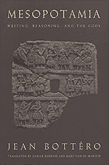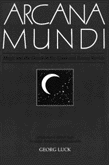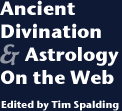General Studies
Studies
Lecture Notes: Magic to Science by Andrew Gregory (University College, London) with 17 lectures, many directly relevant to the interests of this page, including "The Character of Ancient Astrology and Alchemy" [MS-Word] and "Babylonian Medicine and Astrology" [MS-Word].
 Amazon. Mesopotamia: Writing, Reasoning and the Gods by Jean Bottero. See the
Chicago UP blurb for more info.
Amazon. Mesopotamia: Writing, Reasoning and the Gods by Jean Bottero. See the
Chicago UP blurb for more info.
The full text of Jean Bottero's "Oneiromancy" from Mesopotamia: Writing, Reasoning and the Gods (1992). Seminal. Bottero's essay on Mesopotamian deam interpretation is as refreshing as his work on the "Code" of Hammurabi and his essay on "Divination and the Scientific Spirit." I suppose the Near Eastern people all know him, but Classics hasn't taken his work up yet.
"Divination and Greek Hermeneutics" research proposal by by Peter T. Struck.
My goal, stated broadly, is to locate where and to what extent divinatory thinking in the classical world expands beyond divinatory practice. It is my hypothesis that, far from being an isolated or idiosyncratic practice, where the famous Greek rationality was temporarily suspended, divination served as a fertile field of thinking, which generated and propagated resources for several other fields that worked with signs and that performed interpretation.This sounds like a very worthy endeavor, but I doubt you could establish connections anywhere near as deep as those Bottero finds in Mesopotamian civilization.
Information on Greek Seers from the relocated "Greek Mythology Link" by Carlos Parada
"Divination" from the Encyclopaedia Iranica. Very full discussion by Mahmoud Omidsalar.
Web Archive: "The Evolution Of Prophetism At Mari And Israel, First Kings 21:17-19" by Mike Furey. Sermon on biblical prophecy and prophecy at Mari.
Web Archive: [Ancient Greek] "Divination: A Practical Guide" from Timespinner, a popular-oriented online magazine on ancient topics. So-so, some links broken.
Web Archive: "Fortune-Tellers of Ancient Mesopotamia" from Zenda, "A Weekly Assyrian Online Magazine" (1998) -- brief popular overview
APA Abstract: Conceptualising Divination: Roman Attitudes and Approaches in the Second Century BC by Alex Nice. For the 2002 APA (American Philological Association) meeting.
The history of divination by "the editor of Heretic Press" (not, apparently Patrick Hanrahan). Lengthy grab-bag of true and false information[1], "Jesus Hoax" arguments, splenetic attacks on "the inner esoteric circle of mental masturbaters who think they are better than others," etc.
Reviews
 Amazon. Review of D. Potter,
Prophets & Emperors. Human and Divine Authority from Augustus to Theodosius (Cambridge MA, 1994).
Amazon. Review of D. Potter,
Prophets & Emperors. Human and Divine Authority from Augustus to Theodosius (Cambridge MA, 1994).
Reviewed by John Vanderspoel, Bryn Mawr Classical Review 1999.
"Slavery and the Shackled Mind: On Fortune-telling and Slave Mentality in the Graeco-Roman World" by Walter Scheidel, The Ancient History Bulletin 1993. Review article on F. Kudlien's Sklaven-Mentalitat im Spiegel antiker Wahrsagerei (1991). Scheidel criticizes Kudliens attempt to extract a "slave mentality" from divinatory literature.
Review of "Pagan Priests. Religion and Power in the Ancient World" by Mary Beard and John North (1990). Reviewed by T. Corey Brennan, BMCR '92. -- Contains essay by North on "Diviners and Divination in Rome."
Review of "Roman Questions: Selected Papers 1958-1993" by J. Linderski (1995). Reviewed by T. Corey Brennan, BMCR 97. -- Contains papers on Cicero and Roman augury.
Texts
Cicero, On Divination (De Divinatione). Finally on the web—book 1 now, book 2 to come. It's on a "wiki," which means you are invited to edit (correct) it. We all thank Jason Davies of Medicina Antiqua for putting this up. Get to work. $1,000 prize for most typos caught. Okay, not really.
 Amazon. Arcana Mundi : Magic and the Occult in the Greek and Roman Worlds by Georg Luck (1985). Luck provides long translated extracts, together with an introduction. He covers "Magic," "Miracles," "Daemonology," "Divination," "Astrology", and "Alchemy." His section on divination is heavy with excerpts from Cicero's
De Divinatione (On Divination), an easily-found source.
Amazon. Arcana Mundi : Magic and the Occult in the Greek and Roman Worlds by Georg Luck (1985). Luck provides long translated extracts, together with an introduction. He covers "Magic," "Miracles," "Daemonology," "Divination," "Astrology", and "Alchemy." His section on divination is heavy with excerpts from Cicero's
De Divinatione (On Divination), an easily-found source.
There are currently no academic reviews online.Review of Georg Luck's Arcana Mundi by a self-professed believer in Greek paganism.
Suda: "The Prophetic gift" (Propheteia). The Suda is a medieval Greek encyclopedia assembled from earlier sources.
Cicero, De Divinatione at Ad Fontes Academy. Latin text; no translation.
Suda: "Classification of the art of omens" (Diaeresis oionistikes oionistike). The Suda is a medieval Greek encyclopedia assembled from earlier sources.
Web Archive: Catalog of Hittite divinatory texts from the Catalog of Hittite Texts (online continuation of Laroche's Catalogue des textes hittites)
Courses/Student Projects
Course: "Magic and the Supernatural in the Ancient World" , taught by Barbette Stanley Spaeth of Tulane.
"Ancient Greek Divination" Web-project by Jillian R. Frechette, a student in "Magic and Astrology in Greco-Roman Religion." (Prof. Williams, Mt. Holyoke). Lengthy, with a web bilbiography.
Web Archive: Text and close analysis of various passages in Cicero's De Divinatione by Bob Hutchins.
"Divination" notes from lecture by Bradley Laye, a student in "Magic and the Supernatural in the Ancient World," a course at Tulane taught by Barbette Stanley Spaeth. See also discussion questions.
Notes on a class on Divination and Astrology from Barbette Stanley Spaeth's "Magic and the Supernatural in the Ancient World" . See also the exam questions.
Bibliographies
Dreams in Antiquity. An enormous, searchable database of bibliographic entries on divination, especially dreams. The site is in German (despite the title); an English version is in the works. Here, for example is a search on "Artemidorus," which turns up 151 entries.
Web Archive: Bibliography on "Cosmology and divination in European culture" (Dr Peter Moore, University of Kent). From the course of the same name. See also the shorter bibliography of required, essential and background material. See also his Internet resources for the study of cosmology and divination (I stole it all!)
Web Archive: Etruscan Religion Bibliography from the The Etruscan Network by Julia Hayden.
Web Archive: Astrology, Divination, Prophecy, and Magic from "Greco-Roman Studies and the Social-Scientific Study of the Bible: A Classified Periodical Bibliography (1970-1994)" by K. C. Hanson.
Bibliography of Skepticism in the Ancient World by Richard Carrier. The author has a strong ideological/political interest in scepticism. The bibliography has lots of great stuff in it.
Academic bibliography and links on divination in Africa.
Notes:
- The author took offense at reference to "false information," so here are a few choice examples:
- The "closing of the oracles" is attributed to Contantine ("about 300 A.D"). This is too early. The emperor Julian engineered an oracular revival, and they were not finally banned until Theodosius.
- The author swallows that the Sibylline oracles were completed before the Common Era and this date is then used to attack Christianity for its "marketing ploy" in apeing them. In fact, the "marketing ploy" (a rather unsophisticated way of understanding this sort of literature) is quite the reverse: the oracles were completed after the rise of Christianity.
- Oracular divination is reduced to the action of "Sybils," and include the responses given to Croesus and Socrates. In fact, there were no oracular consultations in historic times. Sibyls were always presented as figures of the distant past. Furthermore, the "role" of Sibyls grew over time; our first references (Heraclitus) presumed a single prophetess, but numbers increased in later periods. The "Delphic Sibyl" is a particularly late invention.
- Homer is described as "through whom we know of legends of ... Atlantis."
- The author believes (and presents as simple fact) that oracles employed an international system of trained doves and swallows to fool people into believing they predicted events before human news could arive.

All material © 2000-2004 Tim Spalding. Books presented in association with Amazon.com.
If you enjoy this site you may also like these other sites by me:
The Oracle of Delphi and Ancient Oracles. Covers physical oracles, including academic information and site photos.
Ancient Library. Exciting new project, putting dozens of classical dictionaries and other resources online. There is a category for Ancient Divination.
Angels on the Web. Angels in culture, theology and art. Includes over 550 categorized images.
Hieroglyphics! Comprehensive guide and web directory to Egytian hieroglyphics.
